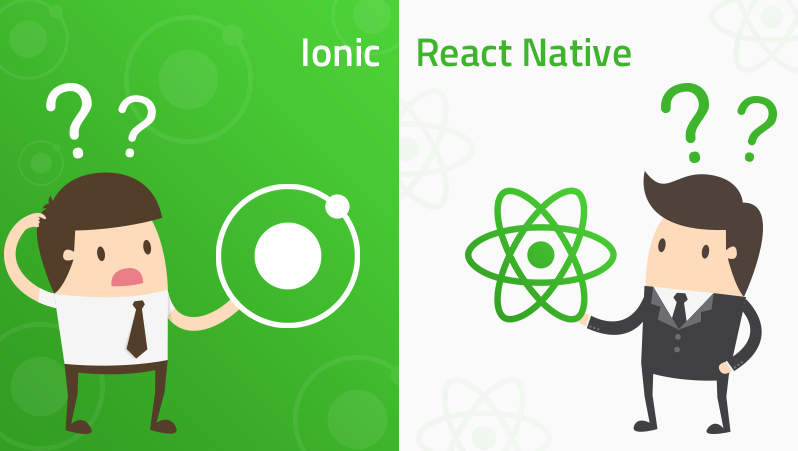Introduction
Organisations have started to rapidly adopt mobile technologies to grow their businesses. From managing day to day tasks to analyzing key data, everything is shifting to mobile platforms and thus choosing the right technology becomes a challenging task. Businesses needs to select a technology that can deliver good performance and which can be easy to code and maintain across platforms.This article will discuss about two of the most popular frameworks – React Native and Ionic, which will help to understand the basic differences between these frameworks. This will include the key features along with the drawbacks.
React Native was introduced by Facebook, a few years back, as a client-side library for UI development. However, being an open-source platform, initially, it was not widely accepted as alternative platforms already existed. However, gradually it became quite popular amongst the developers, as developing App with React Native was easy, with smaller snippets of codes. Moreover, apps developed with React Native platform guarantees better performance, which is a top requirement for a hybrid as well as a native application. However, even Ionic also facilitates easier development of the hybrid mobile application. So, which one you will choose? This is a tricky question, and this article tries to answer this question to the best.
Tabular Comparison of the two technologies
The comparison table in this section provides a snapshot of the differences between, React Native and Ionic.| React Native | Ionic | |
|---|---|---|
| Languages Used | React & JavaScript | Web Technologies (HTML, CSS, JavaScript, Angular, JS, TypeScript) |
| App Type | Preferred for Cross-Platform Apps | Preferred for development of Hybrid Apps |
| Developed By | Facebook Community | Drifty.co |
| Popular Apps | Bloomberg, Airbnb, Instagram, UberEats | Marketwatch,untapped, justwatch, Pacifica |
| Code Reusability | Code Resusability is possible across the platforms, if development is limited to the fundamental UI primitives. But if you require lot of native customisations than need to maintain 3 separate code bases. | Code reusability is permitted across the platforms. |
| User Interface | In React you can have platform-specific UI design. So if UX is a priority, React Native should be the preferred choice over ionic. | Ionic uses webview to render the User Interface, thereby the UX performance is slower as compared to React Native. |
| Code Testing | The code can be tested only on a real mobile device or an emulator | The code can be tested using any browser. |
| Supported Platforms | Android, iOS, and Windows | Android, iOS, Windows, and PWA |
| Development Cycle | Slower in comparison to the Ionic platform | Faster in comparison to the React Native and Native. |
| Development Cost | Higher Development cost. | Lower Cost of development owing to radpid deployment and easy testing methods. |
Benefits of React Native
Key benefits of React Native are:
- It is known for optimized performance. Improved performances with the help of native controls as well as modules.
- It has got a large community of developers with massive contribution from the community. Thus, it can be described as a community-driven platform. It also means that the developer can get instant support from the community, whenever they need.
- Supports live reloading and hot reloading. Live reloading compiles as well as reads the files, where some changes have been made by the developers. While, hot loading allows to change as well as place the updated files at a specific place, even while the app is running. So, with these features, modify the source code without any need of recompilation.
- This is a cost-effective solution as code can be reused accross platforms. Code reusability also ensures faster delivery.
- A simple interface and easy integration with the third-party plugins.
- It is a stable platform for large & complex projects.
Disadvantages of React Native:
- Can be difficult to learn.
- Security could be an issue as it is a JavaScript library based on the Open Source framework.
- Takes time to initialize.
Benefits of Ionic
Key benefits of Ionic are:
- It is easy to learn if one is familiar with web technologies.
- One can develop apps rapidly by using certain commands from the command line, rather than coding from scratch.
- It is a platform independent framework, and code developed on one platform can be reused on other platforms.
- Facilitates lower cost of development with minimal maintenance.
- It has got greater community support, which means instant support is available on an event of any issues.
- It has got rich pre-styled built-in components, which are easy to learn.
Disadvantages of Ionic are:
- Performance is not as good as the native apps.
- Native functionality is limited.
- Not suited for high-end applications that use native capabilities.


